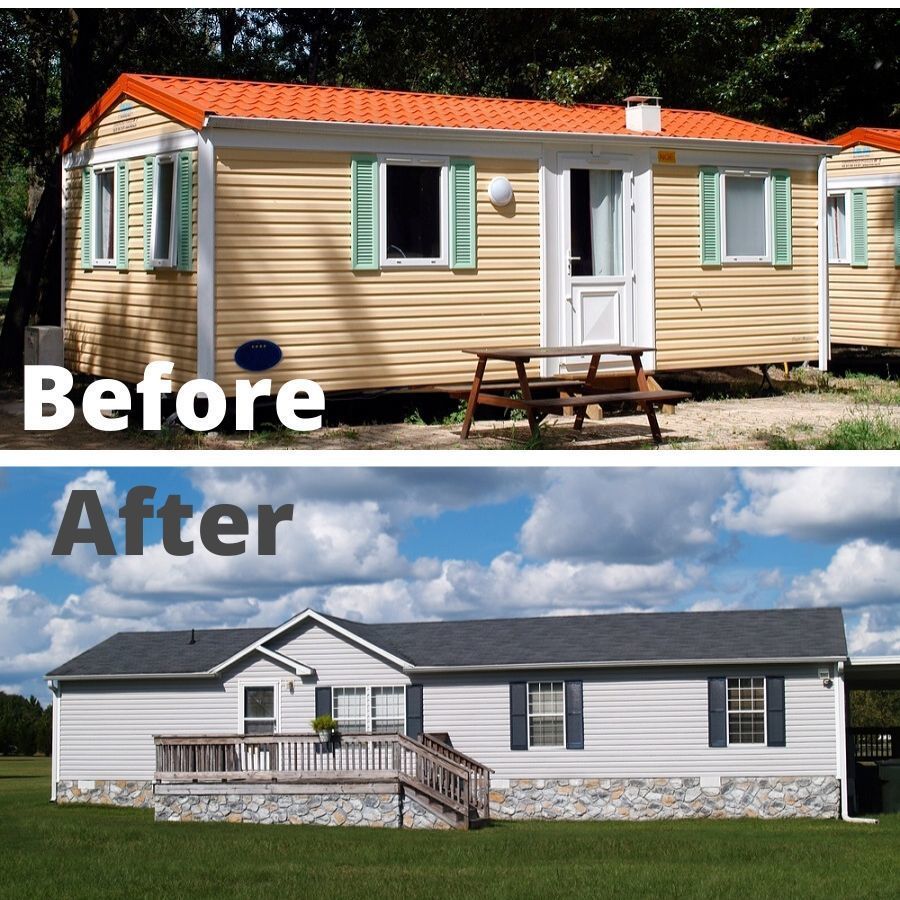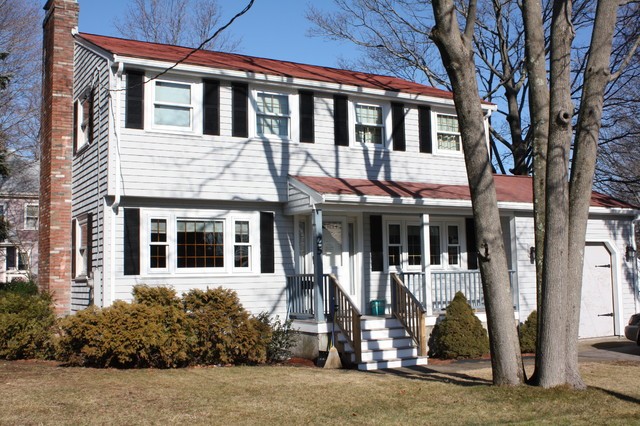
If you are looking to improve the look of your mobile home, consider installing new siding. This can give your mobile home a modern, fresh look that will also make it more energy efficient.
There are several types of siding that are appropriate for your mobile home. It is important that you choose a product to fit your budget and needs. You also need to ensure the product is durable. You need to know how long the material will last and how much it costs to maintain.
It is important to look into the different types of siding available to choose the right type for your mobile house. Ask other owners of mobile homes where they bought their exterior panels. It is possible to compare prices online and at your local hardware store.

One of the best types of mobile home siding is plywood. This product is a lot more affordable than other siding options. It is made up of smoother, larger wood sheets which can be sanded easily. It's more difficult for you to seal or paint. They are also more susceptible to holes and wood decay.
Another option is fiber cement. This material is made of silica, wood fibers, and cement. It can replicate the appearance of other types. This product is suitable for those who like the look and feel of wood, but are concerned about pests and mold. This product is available at your local hardware and mobile home parts stores.
Cedar is another popular choice for siding mobile homes. This siding is naturally insect repellent. It is durable and easy to put up. It is vulnerable to moisture damage that can lead to mold. To avoid water damage, it is recommended to mount it vertically.
Smart panel siding, which is durable, is designed to last at most 50 years. It can be used over your existing siding. It can be finished in wood grain to give it a unique appearance.

Vinyl is another great option for mobile home siding. Vinyl is easy to install and can be found in many colors. It is also very durable and has a high resell value. Remember that you will need a professional to install the product.
Before deciding on a new siding for your mobile home, you should decide what kind of upkeep you'd like to have. This is crucial because while you can find low-maintenance products that are inexpensive, they can also be more costly long-term. It is possible to save money on home maintenance if your plans are to move in the near future. But if you're planning on staying in your house for the foreseeable future you will need to invest in products which increase your home’s energy efficiency.
FAQ
What are my considerations when purchasing a new house?
Be sure to have enough money in reserve for closing costs before you purchase a new home. You might consider refinancing your mortgage if you don't have enough money.
You can live in a house while it is being renovated.
Yes, I can live in a house while renovating it
Are you able to live in your house while the renovations are ongoing? It depends on the length of the construction. If the renovation process lasts less than 2 months, then yes, you can live in your home while it's under construction. You can't live there if your renovation project takes more than two months.
There are many reasons why you should not live at home during major construction projects. You might be hurt or even die from falling objects on the site. You could also suffer from noise pollution and dust caused by the heavy machinery used on the job site.
This is especially true if your house has multiple stories. If this happens, the sound and vibration caused by the construction workers can cause significant damage to your home and contents.
As I mentioned before, while your home is being remodeled, you'll have to manage the inconveniences of living in temporary shelters. This means you won’t have the same amenities as your own home.
For example, you will not be able to use your washing machine and dryer while they are undergoing repair. You will also have to put up with the smell of paint fumes and other chemicals as well as the loud banging sounds made by the workers.
All these factors can result in stress and anxiety within your family. Therefore, it is important to plan ahead in order not to feel overwhelmed by the situation.
Do your research before you begin renovating your home. You can avoid costly mistakes later.
You should also seek professional help from a reputable contractor to ensure everything runs smoothly.
What is the cost of renovating a house?
Renovations are usually between $5,000 and $50,000. Renovations can cost homeowners anywhere from $10,000 to $20,000
How long does it usually take to renovate your home?
It all depends upon the size of your project and how much time it takes. An average homeowner will spend three to six hours a week on the project.
Is it worth the extra cost to build or remodel a house?
If you're thinking about building a new home, there are two options for you. Pre-built homes are another option. This type of home is already built and ready to move in to. Another option is to build a custom home yourself. You will need to hire a professional builder to help design and construct your dream home.
The cost of building a new home depends on how much time and money you spend designing and planning it. You'll probably need to do the majority of the construction work yourself if you build a custom home. This will require more effort. However, you have more control over what materials you use and where they are placed. So, it might be easier to find a contractor who specializes in building custom homes.
A new house is generally more expensive than a home that has been renovated. The reason is that you'll need to pay more for the land, as well any improvements. Permits and inspections are also required. The price difference between a newly built and remodeled home averages $10,000-$20,000.
In what order should home renovations be done?
First, decide where you want everything to go in your renovations. If you plan to sell your home soon, then you should think about how you would like to present your home to potential buyers. The next step is to plan the layout of your living, kitchen, and bathroom. Once you have chosen the rooms you want to remodel, you can start looking for contractors who can help you. You can then begin your renovations once you have hired an expert contractor.
Statistics
- They'll usually lend up to 90% of your home's "as-completed" value, but no more than $424,100 in most locales or $636,150 in high-cost areas. (kiplinger.com)
- Most lenders will lend you up to 75% or 80% of the appraised value of your home, but some will go higher. (kiplinger.com)
- It is advisable, however, to have a contingency of 10–20 per cent to allow for the unexpected expenses that can arise when renovating older homes. (realhomes.com)
- According to the National Association of the Remodeling Industry's 2019 remodeling impact report , realtors estimate that homeowners can recover 59% of the cost of a complete kitchen renovation if they sell their home. (bhg.com)
- The average fixed rate for a home-equity loan was recently 5.27%, and the average variable rate for a HELOC was 5.49%, according to Bankrate.com. (kiplinger.com)
External Links
How To
How to renovate an older house
Before you start, it is essential that you decide which type of renovation project to undertake. This could range from simple updates to your kitchen appliances, to completely changing the look of the entire house.
Once you decide what kind of renovations you want, you will need to calculate how much money is available. You might discover that you don't have enough funds for the entire project. If this is true, you will need to make hard decisions about which areas you can afford to fix and which ones you won't.
You need to be sure that before you do any renovations you are aware of the following things. You must ensure you have all the permits needed for the job. It's also worth checking whether you need planning permission to carry out certain types of work. If you are planning to make extensions to your house, you may need to apply to the building consent.
Before you start work on the house it is best to check with the local council website to determine if additional permits are required. Also, check whether you need planning permission for each part of the house that you intend to renovate. If you plan to do major renovations, such as replacing a roof, it is advisable to consult your insurance provider to ensure that you have sufficient coverage.
The next step after getting all the permits you need is to choose the right tools and materials for the job. You have many options. It is important to carefully research all of them. The most popular items used in renovation projects are paint, wallpaper paste and flooring.
Make sure you look at the product's quality before purchasing these items. Quality products last longer than cheaper products and are less expensive. When buying anything, it's important that you buy the right amount for the job. Don't buy too many because you could end up wasting precious resources and having to discard large quantities of material. Instead, make sure you only purchase what you really need.
After you've selected the right materials for your job, you should plan where to store them while working on the property. If you're planning on renovating a large space of your house, you might need storage space. Alternatively, you could ask family members or friends to help you move all the items around.